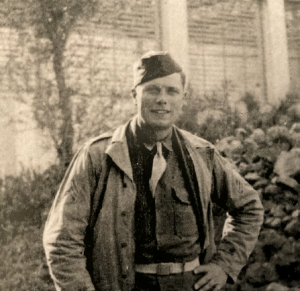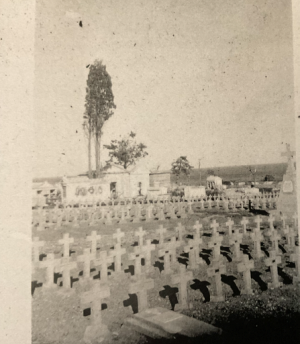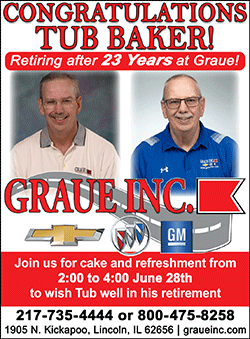|
 The
reluctant Hero The
reluctant Hero
Chuck Fricke shares the stories his dad never told him
By Charles and Penny
Fricke
 Send a link to a friend
Send a link to a friend
[June 26, 2024]
Armin Ernst Fricke was the eldest son of
John Henry Fricke, an immigrant from Osnebrocht Germany. John Henry,
age 17, fled Germany in 1904 landing at Ellis Island, New York, with
his two brothers William 15, and Henry age 14. It was at this time
that Kaiser Wilhelm II, the last German Emperor and King of Prussia
was raising an army for Germany prior to WW I. In 1917 John Henry
was drafted into the U.S. Army, but WW I came to an end before he
left the farm in Meredosia, Illinois. How ironic!
|
|
 Armin
graduated mortuary school in the fall of 1941 and enlisted in the
army, as did millions on December 8, 1941. With his medical and
mortuary knowledge, speaking and writing knowledge of the German
language he was immediately a candidate for becoming an Army medic.
His two younger brothers also joined the military in WW II and his
fourth brother served in Korea in 1952. A true Band of Brothers!
Armin became a member of the 232 Medical Battalion, 125th Regiment,
and the 34th (Red Bull) Division. He was sent to Africa, on June
1943 upon the USS Chateau Thierry arriving in Oran French Algeria
Africa. It was at this same time that Generals Omar Bradley and
George Patton were chasing General and Field Marshall Erwin Rommel
(Desert Fox) across Northern Africa thru Tunisia. The Red Bull
Division was the first division deployed to Europe and became the
most decorated and longest serving division on front line duty
serving 517 straight combat days. Armin
graduated mortuary school in the fall of 1941 and enlisted in the
army, as did millions on December 8, 1941. With his medical and
mortuary knowledge, speaking and writing knowledge of the German
language he was immediately a candidate for becoming an Army medic.
His two younger brothers also joined the military in WW II and his
fourth brother served in Korea in 1952. A true Band of Brothers!
Armin became a member of the 232 Medical Battalion, 125th Regiment,
and the 34th (Red Bull) Division. He was sent to Africa, on June
1943 upon the USS Chateau Thierry arriving in Oran French Algeria
Africa. It was at this same time that Generals Omar Bradley and
George Patton were chasing General and Field Marshall Erwin Rommel
(Desert Fox) across Northern Africa thru Tunisia. The Red Bull
Division was the first division deployed to Europe and became the
most decorated and longest serving division on front line duty
serving 517 straight combat days.

During his deployment , my father started a journal
with three to four sentences per day as well as taking pictures with
his Brownie camera. That diary contains an infantryman’s account and
experiences through some of the worst days of a 26-year-old farm
boy’s life. He took pictures of the losses at the Lion Mt. cemetery
south of Oran in Tunisia Africa after Hill 609.

Sergent Fricke center with General
Clark Later Armin’s deployment took him
in landing crafts into Sicily through Palermo and Messina, under
General George Patton and then the landing into Italy itself under
General Clark.
After the surrender of Italy and the beginning retreat of the German
Army under the command of Field Marshall Albert Kesselring, which
was later convicted of War crimes, the German army stripped the
countryside of food and housing to the Italian population. My father
along with his band of brothers and the rations they were allotted
helped save many men, women and children by sharing what rations
they were allocated. One such individual child named Pamela, a
recent orphan when her parents were recently killed in a bombing
raid was befriended immediately. Upon returning to the stateside he
named his first daughter after her.

Because the German army couldn’t afford to take
prisoners in their retreat they started shooting prisoners. My
father, along with other medics, were issued hand weapons from
captured officers. He returned home with a German Lugar and an
Italian Beretta side arm. It was during this retreated that the high
command of General Eisenhower and Prime Minister Winston Churchill
secretly deployed a type of mustard gas on the ship the “John
Harvey” anchored at the port of Bari, on the Eastern side of Italy
with the anticipation of the Germans gassing the Allies in their
retreat. Falsely feeling the skies were secure from any German
bombing, the John Harvey was hit and exploded with the gas defusing
throughout the near countryside. Armin being in that vicinity
attempted to give aid to the injured, but not knowing the exact
cause of their ailments could only guess on their treatments.
[to top of second column]
 |


Armin Fricke receives his first
Purple Heart pinned by Col. Maxwell at camp base Corsica after being
blinded trying to assist fellow soldiers who had been gassed.
Rubbing his eyes continuously with his sleeves he
also succumbed to a temporary blindness which hospitalized him for
30 days. Many others had permanent damage. Armin’s pictures show
many men in a pond bathing themselves to lessen the gas. Not until
1967, through the Freedom of Information Act, did the government
acknowledge the incident. A series of books by author Rick Atkinson,
“AN ARMY AT DAWN” and “THE DAY OF BATTLE” did we, as a family,
realize the true cause of our fathers injuries. This was 30 years
after his death.

Upon returning to active duty the 34th Division was
sent to the Abbey at Monte Cassino in January 1944. For three months
it became the bloodiest battle in Italy with over 50,000 Allied
deaths, and 20,000 Germans. It was here that Armin received his
second Purple Heart. Because of his injury Armin was with his unit
when it was deployed to Normandy.
After “THE ABBEY”, Armin’s services took him through Naples, Foggia
-Arno, and the liberation of Rome.
Armin received the American Theater Ribbon, European-Africa- Middle
Eastern Ribbon with W/2 Bronze battle stars.
Upon his return to the states Armin married Vivian Wise of
Jacksonville and became a funeral director and ambulance driver for
30 years. He never once volunteered to tell his military history to
me, his son. When asked he would merely say he put bandages on
wounded soldiers. If he told my other brother or sisters anything
different I am not aware of it.
Armin died in 1986. Vivian died in 2008. It is at that time our
family found his history, story, and military German Lugar and
Italian 380 Barrett pistol.
During his time as a funeral director Armin made many funeral
arrangements for Veterans. Nathan Fricke, Armin’s grandson, years
later was making funeral arrangements for a veteran with his three
daughters. He asked if they wanted a military service. They answered
with a “No” as dad never mentioned his time in the service so he
must not feel extremely proud of his time in the service. Upon
reading that veterans DD 214, Honorable Discharge, he was at
Normandy, The Battle of The Bulge, and three other major battles.
I’m embarrassed to say I should have prodded or asked more questions
of my father and other veterans Their stories are worth the effort!
My father is no more a hero to the world than a million other
veterans, but he does stand out amongst our family. Being asked to
share his diary and pictures is enough reward to us after 80 years.
|